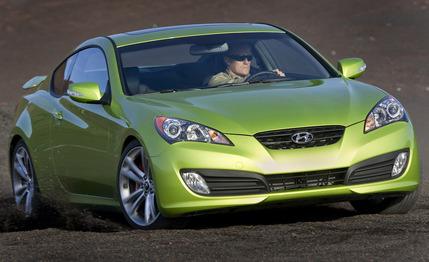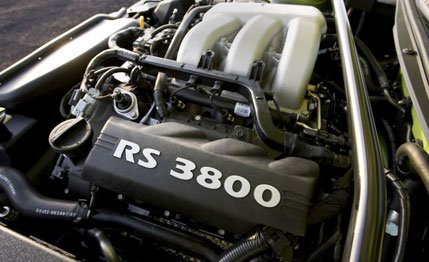
 Road Test
Road Test
Click here to read our road test on the Genesis Coupe 2.0T Turbo.
C’mon, really? Hyundai? No pedigree. No racing history. No factory museum filled with dusty glory machines. Yet here’s what Hyundai dares—dares!—to call the phosphorescent-Slurpee spill of paint on our Genesis coupe: Lime Rock Green.


Puh-leeze! Weren’t these jokers riding around on donkeys when Bob Sharp was running 240Zs at Lime Rock? There’s also Nordschleife Gray and Interlagos Yellow. On a Hyundai? They can’t be serious!
Uh, they’re serious. On sale since March, the Genesis coupe is a revelation, no pun intended. It’s a genuine yardage gain for the yin-yang team and a serious kink in the law dictating that rear-drive hoots must cost big bucks.
Is it HUN-dye, hi-WON-dye, or hi-YOON-day? (Around the factory, at least, it’s the latter). If we can’t concur on a pronunciation, let’s agree that Hyundai has come a long way. Lately, the workmanship has stood with that of the Japanese masters. The designs are fresh, and the dynamics have firmed up and flattened out.
Still, Korean culture works against a Hyundai sports car. Car guys are scarce in a homeland-come-lately to the auto age. Almost everyone drives thrift cubes—often white, always slow—and Korea only built its first racetrack, Everland Speedway about 35 miles south of Seoul, in 1993. In contrast, Japan has a high-performance heritage going back to the A6M5 Zero.


With Hyundai, it has always been about the price, and so it goes with the Genesis twins. The syrupy $33,000 sedan upon which the coupe is based dives for Lexus’s knees. The four-seat coupe also aims below the waist at competitors, with a 210-hp, 2.0-liter turbo four starting at $22,750 and a 306-hp V-6 at $25,750. The standard-equipment list is decent and includes a six-speed manual, power locks and windows, cruise control, stability control, a trip computer, and stereo auxiliary jacks.
The 2.0-liter turbo Premium and V-6 Grand Touring are the middle models, with leather, sunroof, and hot stereo, while the loaded Track version comes with all that, plus a stiffer suspension, Brembo brakes, limited-slip diff, and trunk spoiler. The V-6 Track runs $30,250, right where the foreign rivals start.
The base Nissan 370Z opens at $30,625, a poverty-trim BMW 128i, at $30,225. Only a strip-o Mazda RX-8 swings lower, at $27,105. The Genesis coupe is the first Asian to move into the neighborhood ruled by Mustangs, Camaros, and Challengers. As in the movie Gran Torino, we’re expecting fireworks.

 NAKED
NAKEDConsidering the price—always considering the price—Hyundai has bull’s-eyed the target, starting with specs that are right for enthusiasts. Firstly, it’s rear drive, the ne-plus-ultra credential for a sporty car. Also, the base 2.0-liter turbo offers wiggle room for tuners, the V-6 enough horsepower to satisfy if not electrify with its 5.7-second runs to 60 mph (all on regular gas!).
And there’s no shell game with the performance options. Six-speed manuals can be had with both engines, as can the Track equipment group. The V-6 gets a name-brand ZF six-speed automatic with paddle shifters (turbos get a five-speed auto made by . . . somebody). A harder-core R-Spec model is coming as basically a Track version cleansed of luxury bits. As you see, Hyundai is working to get this right.
Even after cutting 4.6 inches from the Genesis sedan’s wheelbase, Hyundai still had a plus-size form to clothe. The wheelbase is 10.6 inches longer than the new Z’s, and the body is 15.1 inches longer. There’s enough capsule space for a pair of folding back seats with decent legroom, though Hyundai opted—wisely, we think—to favor a foxy roofline over adult-rated rear headroom. Quarter glass that sags down for extra visibility also gives the coupe some graphic identity, as do the two scimitars for headlights. The fenders bulge alluringly with their big Bridgestones. However, Hyundai couldn’t resist pasting on a corporate Sonata grille that does little for cooling and even less for the coupe’s cunning visage.